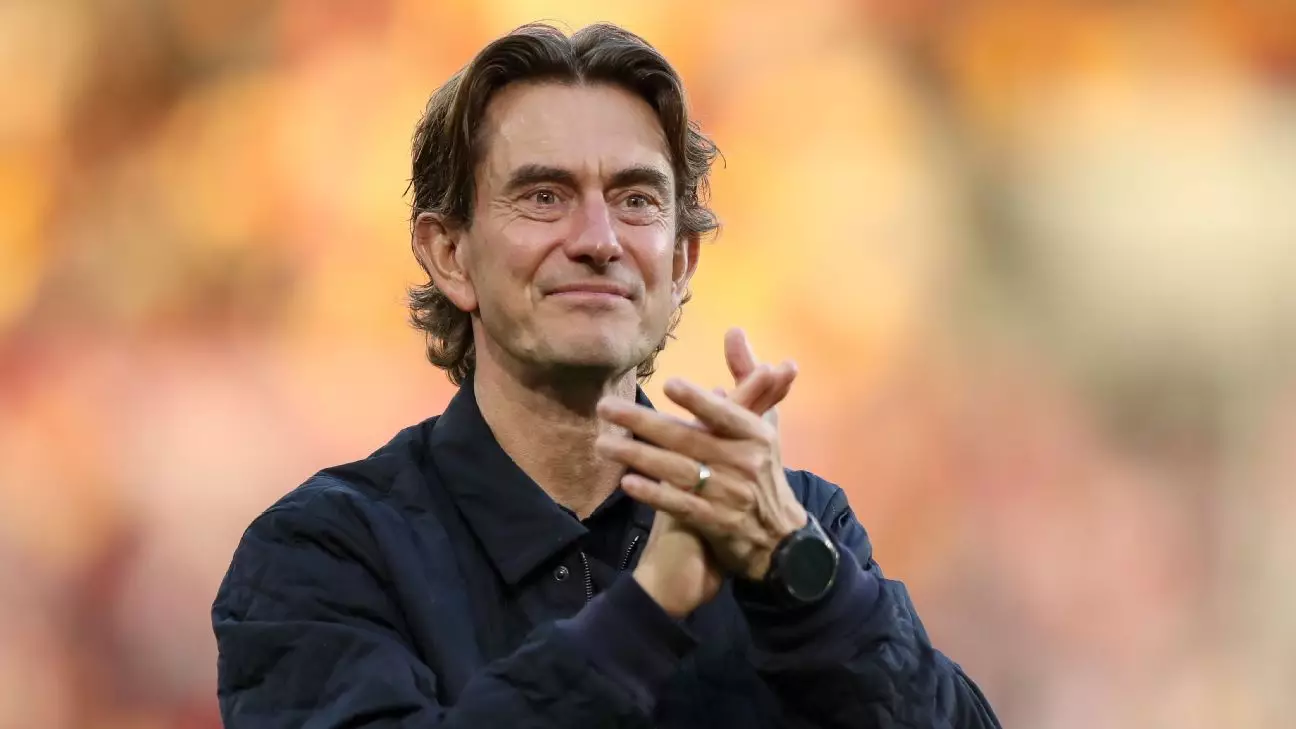Thomas Frank’s decision to take the managerial helm at Tottenham Hotspur was not merely a career move; it was a declaration of intent. His playful comment about seeking “more risk” in his daily life reveals a deep desire to break free from the comfort zone and embrace the unpredictable nature of managing a top-tier club. Unlike his tenure at Brentford—a period marked by methodical growth, strategic promotion, and establishing himself as a rising force—Frank now strides into an environment fraught with high expectations and pressing demands. His arrival signals a shift towards a more daring, bold approach, one that values long-term vision over short-term appeasement.
Frank’s honesty about the risks underscores a philosophical stance: sustainable success at a club like Tottenham demands courage, patience, and relentless ambition. It’s easy to dismiss managerial change as a cosmetic fix or a desperation move, but Frank’s mindset elevates it into an opportunity for genuine transformation. His willingness to accept the volatility associated with high-stakes football is refreshing—if not slightly reckless in the eyes of traditionalists—and suggests a leader committed to reshaping Tottenham’s identity from reactive to proactive.
Long-Term Ambitions and the Reality of the Modern Premier League
At the heart of Frank’s philosophy lies a clear-eyed focus on longevity. His conversations with Tottenham’s hierarchy—chairman Daniel Levy, CEO Vinai Venkatesham, and Technical Director Johan Lange—centered on an optimistic yet pragmatic plan to rebuild the club with patience and persistence. This reflects a critical understanding: in the turbulent landscape of English football, instant success is elusive; sustainable growth is the true measure of greatness.
His acknowledgment that Tottenham is currently behind Arsenal, Manchester City, and others in the pecking order is honest and strategic. Rather than promising immediate trophies, Frank emphasizes incremental progress, emphasizing that the club’s ambitions are rooted in a sustained pursuit of excellence rather than quick fixes. Such a mindset, if properly executed, could elevate Tottenham into a consistent top-four contender and possibly beyond, provided the club adopts a culture of patience and continuous improvement.
Crucially, Frank’s stance departs from the often reactionary managerial cycles seen in the Premier League. His statement about preferring to “take one step at a time” signals a calculated approach—an understanding that long-term success requires stability, a clear vision, and resistance to knee-jerk reactions from the fanbase and board alike.
Balancing Ambition with Reality: The Transfer and Leadership Dilemmas
Within this strategic framework, questions surrounding key players like Son Heung-Min and Cristian Romero reveal the complexities of Tottenham’s current squad. Frank’s reluctance to confirm Son’s captaincy or clarify Romero’s future indicates an awareness of the delicate balancing act required to maintain squad harmony while navigating transfer speculation.
His focus on the players’ professionalism and training standards suggests he values a disciplined, hardworking culture. Yet, the unresolved status of leadership roles and potential transfers also reflect the turbulent ecosystem of football management—where player retention and squad composition can make or break a long-term project.
The club’s recent signing spree, coupled with the questions about squad stability, highlights the tension between immediate squad reinforcement and building a cohesive team aligned with Frank’s long-term vision. It is a gamble—bringing in new talent to challenge the existing order while ensuring that the club’s core remains intact enough to implement a sustained strategy.
Does Tottenham Have the Patience for a Visionary Manager?
Frank’s approach isn’t just about tactical setups or recruitment; it’s about cultivating a mindset of resilience and ambition. His optimism, coupled with his acknowledgment of the inherent challenges, makes him a compelling but risky choice for Tottenham. The club’s history of managerial turnover—five managers in as many years—raises doubts about how much patience the hierarchy and fans are willing to extend to someone who openly invites risk.
However, if Tottenham is genuinely committed to a long-term project, Frank’s perspective could serve as a catalyst for genuine change. His success at Brentford demonstrates he can develop underdog teams into formidable forces—qualities that are sorely needed at Tottenham, a club with a rich history but recent struggles to translate promise into consistent success.
Frank’s tenure will test Tottenham’s willingness to embrace a bold, ambitious philosophy rooted in risk and patience. Whether this will prove to be a recipe for sustainable growth or a reckless gamble remains to be seen. What is clear, however, is that Frank’s leadership heralds a shift towards a more daring, visionary future—one that, if given the time and support, could redefine Tottenham’s identity in the modern era.

